

World Bank Head Calls for Carbon Pricing to Rescue Climate. DAVOS, Switzerland, January 27, 2014 (ENS) – At the World Economic Forum in Davos, World Bank President Jim Yong Kim called for a price on carbon, requiring companies to disclose their climate risk exposure, and greater investment in green bonds in the fight against climate change.
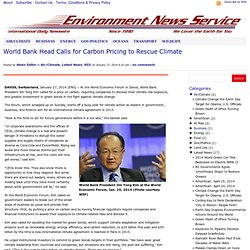
The forum, which wrapped up on Sunday, starts off a busy year for climate action as leaders in government, business, and finance aim for an international climate agreement in 2015. “Now is the time to act for future generations before it is too late,” the banker said. World Bank President Jim Yong Kim at the World Economic Forum, Jan. 25, 2014 (Photo courtesy WEF) “In corporate boardrooms and the offices of CEOs, climate change is a real and present danger. It threatens to disrupt the water supplies and supply chains of companies as diverse as Coca-Cola and ExxonMobil. “CEOs know this. He urged institutional investors to commit to green bonds targets in their portfolios.
“Recently I visited the Philippines. World Bank Calls for Soot, Methane Reduction. A new World Bank report calls for the reduction of shorter-lived pollutants, such as soot and methane, that could slow the pace of climate change and save lives.
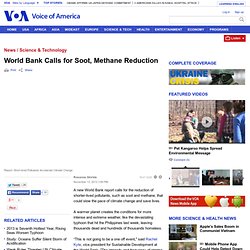
A warmer planet creates the conditions for more intense and extreme weather, like the devastating typhoon that hit the Philippines last week, leaving thousands dead and hundreds of thousands homeless. “This is not going to be a one off event," said Rachel Kyte, vice president for Sustainable Development at the World Bank. "The intensity and frequency of storms as a result of climate change is very clear from the climate science and the evidence and is something that many countries will have to prepare for.”
The World Bank's new report, On Thin Ice, deals with the cryosphere, the planet's perpetually frozen places: the Arctic, the Antarctic, the Andes and the Himalayas. There, temperatures are rising at more than twice the global rate. X “We’re seeing catastrophic change potentially in these regions," Kyte said. World Bank joins war on coal. There’s a new ally in the fight against the dirtiest of fossil fuels.
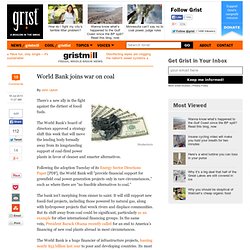
The World Bank’s board of directors approved a strategy shift this week that will move the lending body formally away from its longstanding support of coal-fired power plants in favor of cleaner and smarter alternatives. Following the adoption Tuesday of its Energy Sector Directions Paper [PDF], the World Bank will “provide financial support for greenfield coal power generation projects only in rare circumstances,” such as where there are “no feasible alternatives to coal.”
The bank isn’t morphing from sinner to saint. It will still support new fossil-fuel projects, including those powered by natural gas, along with hydropower projects that wreck rivers and displace communities. But its shift away from coal could be significant, particularly as an example for other international financing groups. World Bank Climate Change Report Says 'Turn Down The Heat' On Warming Planet. * Poorest regions hit hardest * World Bank focuses on climate change under new chief * Must balance climate change with energy needs of poor By Anna Yukhananov.
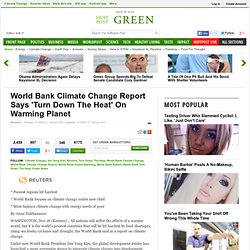
La Banque mondiale redoute le "cataclysme" d'un réchauffement climatique de 4°C. La Banque mondiale n'hésite pas à parler d'un "cataclysme" qui pourrait frapper les pays pauvres.
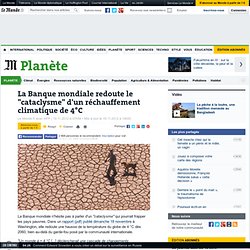
Dans un rapport (pdf) publié dimanche 18 novembre à Washington, elle redoute une hausse de la température du globe de 4 °C dès 2060, bien au-delà du garde-fou posé par la communauté internationale. "Un monde à + 4 °C [...] déclencherait une cascade de changements cataclysmiques, dont des vagues de chaleur extrême, une chute des stocks alimentaires et une montée du niveau de la mer frappant des centaines de millions de personnes", résume la Banque mondiale, ajoutant qu'il n'y avait "aucune certitude" que le globe puisse s'adapter à une telle situation. Ce scénario, le plus sombre envisagé dans le rapport, tranche avec l'engagement pris par la communauté internationale de contenir le réchauffement du globe à + 2 °C par rapport à l'ère pré-industrielle.
Aucune région ne sera épargnée, prévient toutefois le rapport. Lire aussi : "Le réchauffement est prouvé pour 77 % de l'opinion mondiale" Climate change threatens trouble in the near future, World Bank says. Bank officials said this week that those effects are not considered a distant risk anymore, but rather are a near certainty “in our planning period” of the next 20 years or so.
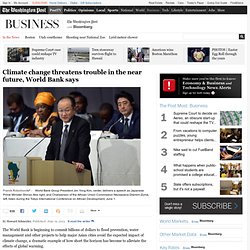
In a study released Wednesday, the bank, for example, projected that major portions of Bangkok would be flooded by 2030. A flood control system built for Ho Chi Minh City only a decade ago is now considered inadequate and needs a $2 billion overhaul, said Rachel Kyte, the bank’s vice president for the environment and sustainable development. The system “was built for a scenario that no longer exists,” Kyte said. “The investment they made is obsolete” for the sea level rise projected in coming years — about half a foot by 2030 under current projections, and double that a decade later.
World leaders have committed to try to curb greenhouse gas emissions enough to limit the global temperature increase to about 3.6 degrees Fahrenheit, or 2 degrees Celsius. Why the World Bank Is Taking On Climate Change. The World Bank, headquartered a block from the White House, was founded after World War II to combat global poverty.
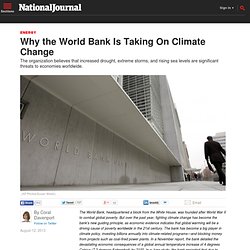
But over the past year, fighting climate change has become the bank's new guiding principle, as economic evidence indicates that global warming will be a driving cause of poverty worldwide in the 21st century. The bank has become a big player in climate policy, investing billions annually into climate-related programs—and blocking money from projects such as coal-fired power plants. In a November report, the bank detailed the devastating economic consequences of a global annual temperature increase of 4 degrees Celsius (7.2 degrees Fahrenheit) by 2100.
In a June study, the bank projected that due to climate change, by the 2030s African countries could lose up 80 percent of cropland and major portions of Bangkok and Vietnam could be flooded. NJ: Why is the World Bank now putting so much emphasis on climate change? Kyte: Absolutely. Kyte: It's a good question.